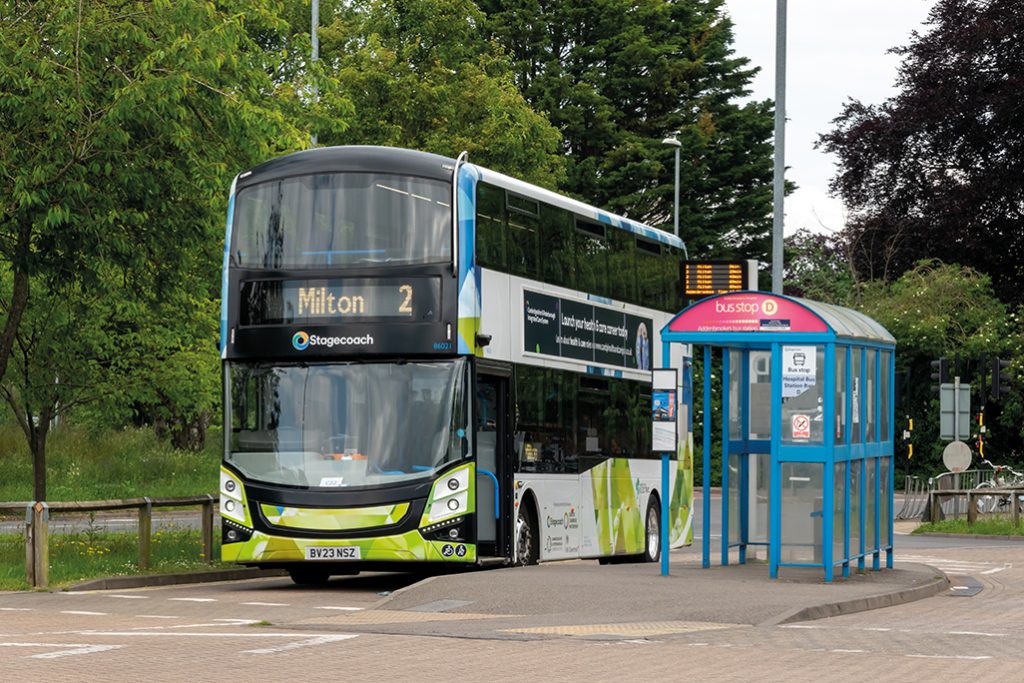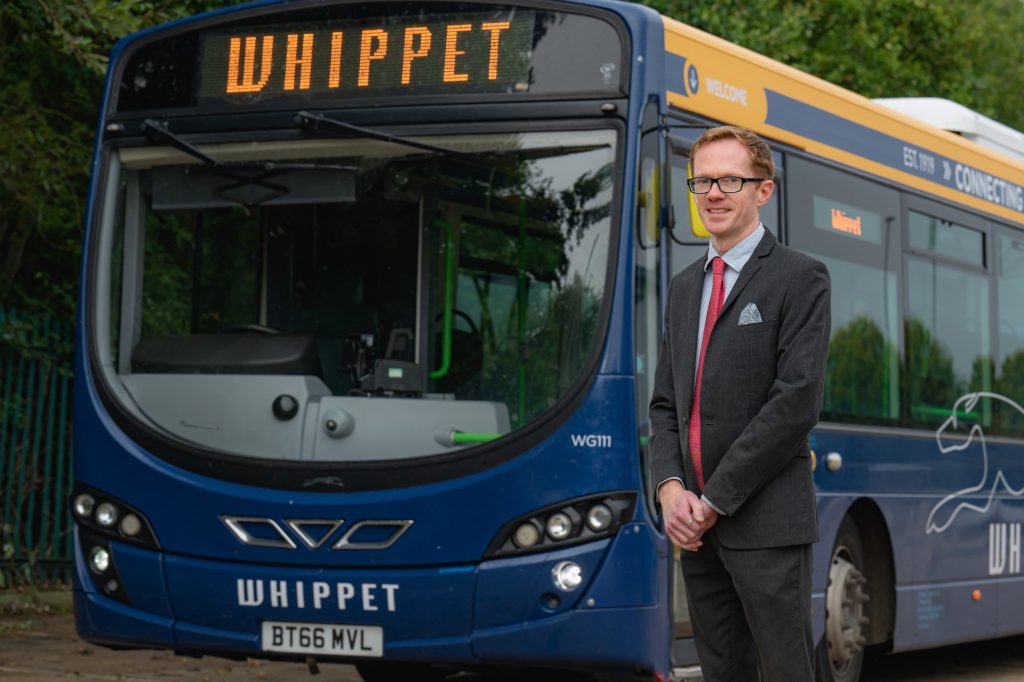Would any bus operator disagree with the sentiment that transport planning relies on a long-term approach? For those that believe it should, local strategies being subject to the whims of the political pendulum presents an inherent risk.
We may soon see an example of how that risk plays out. On 7 May, following an election win and representing a political swing, Cambridgeshire’s new Conservative Mayor, Paul Bristow, immediately made local headlines for his attitude to transport planning, with Cambridge News highlighting his pledge to ‘end the war on motorists’.
One of his first moves has been to scrap a target of reducing car miles driven by 15% by 2030. A sympathetic approach to car use, combined with a promise for more free parking in town centres, hardly makes for encouraging reading to the region’s bus operators.
The new Mayor also demonstrates that any brief consensus on public transport between England’s two main political parties may have been somewhat of an aberration.
routeone took an interest when it heard that Cambridgeshire and Peterborough Combined Authority (CPCA) officers had quizzed operators on the topic of reversing a franchising arrangement, should there be a political swing, sometime between December and January. A CPCA Transport and Infrastructure Committee then voted unanimously that franchising was the best avenue of service reform on 24 January.
While acknowledging the challenges that franchising presented, the largest operator in the region, Stagecoach, stated it was pleased that the decision “gave some clarity”.
While neither Paul Bristow nor a representative was available for comment, his position on bus franchising was set out more clearly within his manifesto, published on 28 April.
It acknowledges that franchising will happen, but that it is “premised on doubling the number of passengers on buses within five years, despite a consistent decline in bus use.” Instead of looking at ways of achieving that, the Mayor plans to scrap the target to double bus use by 2030, focusing instead on “routes and convenience”.
Further criticism is levelled against franchising within rural areas, demand-responsive alternatives, and zero-emission bus targets. A promise is also made to scrap the latter, and to launch an independent review of the current business case for franchising, as well as its proposed operating model. A summit will be held with coach, bus and community transport operators to establish “a proper working relationship”.

Reversing a franchise
Though not explicitly stated, it is hard to resist making the logical leap to considering what might happen if the favoured route from this is to reverse the franchising mechanism. When the topic was broached before, CPCA officers recognised that it would be expensive and time consuming. So could it really happen?
There is a means of doing so, but the mechanism is a curious one. Revocation of a franchising scheme falls under section 123N of the Transport Act 2000, where it is stated that a scheme may only be revoked if the authority or authorities operating it are satisfied that:
- Local services in the area to which the scheme relates are likely to be better if the scheme did not apply
- The continued operation of the scheme is likely to cause financial difficulties for the authority or any of the authorities, or
- The burdens of continuing with the scheme are likely to outweigh the benefits of doing so.
Freeths Director and transport lawyer Frank Suttie, who has advised on the reregulation process in England, notes that taking any of these positions represents a “fundamental reversal” of the assurances provided in the case for implementing franchising to begin with.
Last year, Frank shared his thoughts on how the franchising structure could be changed to work better for local transport authorities and operators. He noted then that transitioning from one model to another represented the bulk of the challenge with any implementation of a franchise model. How difficult it might then be to about turn is a question that is not easily answered.
“A change of political control makes the decision easier to take, of course, but a process similar to that under which the franchising scheme was progressed must be followed, with statutory and public consultees involved again, and a business case setting out the reasoning behind the decision,” he explains. “The position is relatively straightforward if no franchise contracts have been awarded. If they have been, then this is a whole different ball game.”
Paul Bristow’s manifesto acknowledges that franchising will go ahead, regardless of the criticism laid out. Therefore, a theoretical decision to reverse franchising in Cambridgeshire would surely mean contracts being awarded by that time. So how might such a decision affect existing franchisees?
“It’s important to remember that operators will very likely have halted investment in depot and fleet from the point at which it became clear that franchising was to proceed,” Frank says.
“No business would make significant investment decisions when its future operation of the business is at risk. There may be deals to be unwound if the operator has given rights to the franchising authority to acquire ownership of depots and fleet, but that arrangement has not yet been implemented.
“If the reversal decision happens after the first franchise contracts have been awarded, the operator may have contractual rights to require the contracts to continue, and for it to be paid for providing the services contracted for. If the authority wants to back out of contracts immediately, there will be compensation claims on whatever basis the contract provides for these.”
Aside from that compensation to operators, there are other financial risks to weigh up. The authority will have made significant investment in personnel and technology.
Frank notes that a number of franchising authorities have committed to providing as much of the service fleet as they can afford to — and that might involve finance leases. There would be challenging negotiations with operators, potentially persuading them to accept a transfer of the financial liabilities of the authority.
Weighing most in the minds of decision makers would be the exposure to a full consultation exercise. The decision could not be quietly undone through negotiations with operators.
“A developed business case to support a decision of this kind will reveal significant financial consequences,” Frank adds. “Moving back to a commercial or supported service model would also have complications with the need to tender, once again, supported services.
“Passing back to operators’ decision making in areas such as fare setting should also feature in the thinking of decision makers, as would the potential for the existing network of services to be reassessed by operators — leading to potential service losses or scaled back timetables. None of this will be a good look for the politicians that spoke out so stridently about the benefits of franchising.”
Frank notes also the difference between public and private sector approaches to such projects. A public sector mindset tends to lead to a determination to achieve the outcome desired, regardless of hurdles and barriers that are encountered, he says — meaning there is no evidence that franchising authorities will be regularly reviewing the factual and risk matrix surrounding their plans to implement franchising.
“In the private sector, we see clients engaged in large and complex transactions routinely re-analysing the transaction, recognising new information and changes in the environment with sometimes a decision to abort.
“While this was exactly what happened with the northern legs of HS2, decisions to abort are rarely seen with public sector projects. Having looked in detail at the difficulties involved in reversing a bus franchising scheme it makes the actual decision to proceed even higher stakes than many will think is the case.”

More uncertainty for operators
One operator in Cambridgeshire has shared its main concern; that the limbo between Enhanced Partnership and franchising has resulted in frustration, and a stagnation of action.
Before the election, routeone heard from Ed Cameron, Director of Whippet, who warned that things could not be left as they are, and any further consultation on the franchising decision risked several more years of no confidence.
Eager to begin the detailed discussions on procurement and the practical role Whippet could play in a franchised network, Ed felt the better option would be to run with the decision to franchise, and look to ways modal shift — the doubling of passengers — could be achieved.
“The negatives [of a reversal] would outweigh the benefits,” he says. “While we are not against the Enhanced Partnership approach, on balance, franchising is superior for various reasons, and I don’t think it’s possible for that decision to be reversed.
If a business case review is undertaken, with consultations and assessments, and in the meantime we do nothing, that will be very detrimental to the bus network as a whole.
“Whippet would not be able to justify investment in new vehicles. We don’t know what the market will look like in two to three years. I’m sure other operators, from SMEs to the larger groups, would feel the same; what is your business case, your return on investment, with one to two years of uncertainty? It is not one with any positive outcome.”
This all raises the question: If franchising has the power to radically change the local product, by having the power to unify a network under a single livery, app, ticketing method — is it right that such a decision can be threatened by a shift in political winds?
Ed says no; and political spin should be taken out of the decision. “Going down an Enhanced Partnership route or a franchising model is not the type of decision that it should be possible to reverse on a three- or four-year election cycle, made by a county mayor,” he adds. “That doesn’t provide any stability for customers or operators. And franchising fundamentally changes the product that people use. There would be so many ramifications if it was undone.”
That may, in the end, make a U-turn on franchising impossible. A consultation may find doing so to simply be too unwieldy. That could then set lessons for other areas.

Getting the decision right
If a change of political party cannot derail a franchising decision, that brings another concern to the fore where such moves become a contentious issue: That is to ensure a decision to pursue franchising is, in fact, the right one. It becoming a moot point in Cambridgeshire highlights the need to supply local transport authorities with the information they need to make a well-judged decision.
Ralph Roberts, Chairman of McGill’s Bus Group, which has been vocal on the need to acknowledge that franchising does not universally provide the best solution, highlights how essential it is to get this decision right from stage one — and notes that local solutions should be the favoured approach.
“A one-size, let’s-all-copy-Manchester, fits-all approach will do more harm than good,” he says. “Government budgetary pressures are under severe stress and are shape shifting year on year. Public sector borrowing is (as of March 2025) 5.3% of GDP. If buses are still classed as non-essential services, budgets and therefore mileage will be cut.”
The subject of what would happen should Strathclyde Partnership for Transport’s decision prove unfeasible came up in a recent discussion with McGill’s lawyers. “Reversing franchising would not be an easy process and ultimately, who would force it or want to?” Ralph says.
“Once it is in place, I fear that it will be in place for quite some time before anyone moves to change the system, and that all depends on how it is performing. This is why it needs to be done correctly. It is why there needs to be safeguards. We are messing not only with shareholders’ businesses, but people’s lives.”
The Confederation of Passenger Transport echoes this sentiment. Policy Manager Alison Edwards says the trade body is working with industry partners to map the challenges out in more detail, and will be commissioning research to help local areas understand and calculate how risk transfers between bus operators and local authorities under a range of options, and how private investment and expertise can be leveraged across the spectrum of regulatory models.



























